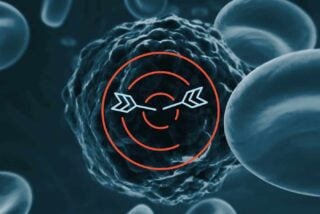
Researchers have found that recurrent rates for mesothelioma can vary widely, with some studies finding recurrence rates after treatment ranging from 10 – 72%. Even patients diagnosed in the earlier stages and who are able to undergo aggressive multimodal treatment have been found to experience recurrence. Because of the rather high likelihood of the cancer recurring, a heavy focus of mesothelioma research is finding optimal second- and third-line treatments for patients who have previously been treated and either experience recurrence or their cancer is unresponsive.
One of the latest clinical trials expected to begin soon at Memorial Sloan Kettering Cancer Center is aiming to test the latest immunotherapy drug, a vaccine called galinpepimut-S (sometimes referred to as the GPS vaccine), in combination with another immunotherapy drug, nivolumab, both of which have shown promising results in extending life expectancies in previous studies.
How the Galinpepimut-S Vaccine Works
The galinpepimut-S vaccine, or GPS vaccine, is noted for targeting the WT1 protein, also known as Wilms tumor-1. In normal, healthy tissues, humans generally express WT1 protein in limited amounts. Over the years, researchers have found that people with mesothelioma and a few other types of cancer generally overexpress the protein. As such, the protein is considered an optimal target for a cancer vaccine.
Cancer vaccines are a type of immunotherapy that elicit an immune system response by targeting a specific protein in the patient. Researchers have been working to make personalized cancer vaccines, as well, which are unique treatments for individual patients based on the idea that each person’s tumors have their own unique genetic makeup. All types of immunotherapy, including cancer vaccines, have been a large focus of cancer research overall, including for mesothelioma.
The GPS vaccine was created by enhancing the immunogenic effects of the WT1 protein by adding four synthetic peptides (molecules that can play a key role in cell activities and are smaller than proteins). In doing so, researchers noted the effect created stability, motivated T cell recognition, and caused immune cells to react against the native WT1. Overall, their pre-development work showed that WT1 could effectively be used as a cancer vaccine in this combination, with pilot studies showing a high immune response rate among patients.
The upcoming clinical trial will utilize the GPS vaccine with nivolumab (Opdivo®), a PD-1 checkpoint inhibitor. Checkpoint inhibitors work by targeting specific proteins in the cancer cells, like PD-L1, to promote an immune response and stop mesothelioma metastasis. Researchers involved in the new study plan to apply the galinpepimut-S vaccine and nivolumab simultaneously with the belief that nivolumab will enhance the efficacy of GPS by further promoting the immune system’s attack of WT1.
Previous Successes with GPS Vaccine and Nivolumab
Mesothelioma researchers are hopeful for this upcoming clinical trial because of the past success both the GPS vaccine and nivolumab have shown separately in other previous studies.
The most recent GPS vaccine clinical trial was published in 2017 after testing 41 pleural mesothelioma patients between May 2011 and August 2015. The study included mostly patients with epithelioid mesothelioma, though 5% of patients were diagnosed with biphasic mesothelioma or mixed cells. Because of the requirements for WT1 expression, malignant sarcomatoid mesothelioma patients were not eligible for the study.
The galinpepimut-S vaccine was tested as a second-line treatment for patients who had previously undergone mesothelioma surgery, whether an extrapleural pneumonectomy or a type of pleurectomy/decortication, followed by chemotherapy. Some patients also underwent intensity modulated pleural radiotherapy or other types of radiation. On average, about 61 days after these treatments, the GPS vaccine was administered six times every 14 days. The study found that the treatment could be well tolerated, with minimal side effects like nausea.
Researchers found progression-free survival of one year was 33% among patients who didn’t receive the vaccine, and 45% in patients treated with GPS. Median overall survival was 22.8 months for patients administered the vaccine versus 18.3 months for the controlled group who did not receive the vaccine.
Nivolumab, or Opdivo, has also seen promising results in a variety of clinical trials, particularly for recurrent or unresponsive mesothelioma. In some of the recent studies, Opdivo has been tested alone and with another immunotherapy drug ipilimumab for previously treated pleural mesothelioma. The studies found that 50 – 68% of the patients achieved controlled disease with the combination treatment after previously undergoing chemotherapy.
Researchers are optimistic that the upcoming clinical trial will further improve the results found in these and other studies testing the immunotherapy drugs. Finding effective second- and third-line treatments for mesothelioma is imperative to combating the poor prognosis and high rates of recurrence.




